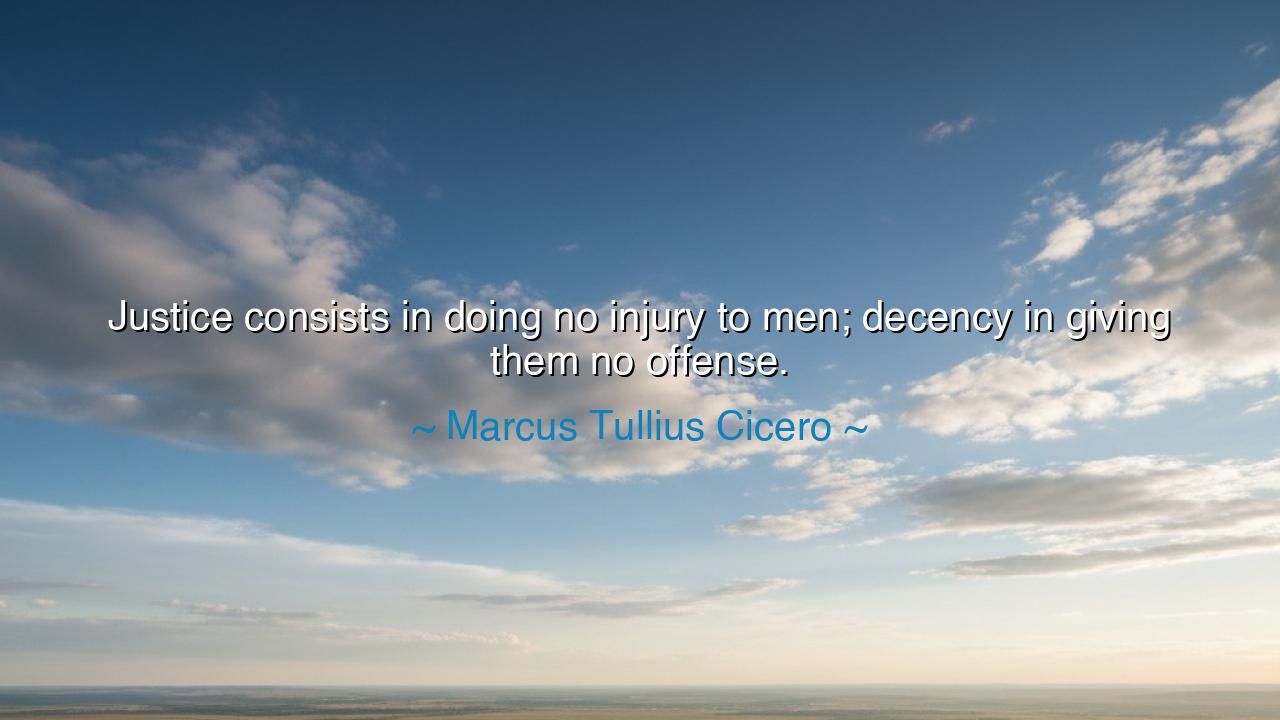
Justice consists in doing no injury to men; decency in giving






Hear now the voice of Marcus Tullius Cicero, the Roman statesman and orator, whose words echo across the ages: “Justice consists in doing no injury to men; decency in giving them no offense.” In this simple yet profound teaching, he sets before us the twin pillars of a life rightly lived—justice and decency. One guards against harm, the other preserves harmony. One shields men from the wounds of action, the other from the sting of insult. Together, they form a rule not only for statesmen and rulers, but for all who walk among their fellow beings.
Cicero, who lived in the waning days of the Roman Republic, sought always to define the nature of virtue and the duty of man to man. To him, justice was the foundation of law and of civilization itself: no man should suffer harm at the hands of another, for in such restraint lies peace and stability. But he saw too that decency is no less vital. For even when one causes no injury in body or property, careless words or dishonorable conduct may poison the bonds of trust. Thus, Cicero joins justice and decency together, warning that society cannot endure on justice alone without the courtesy and respect that decency provides.
History offers us many witnesses. Consider the story of George Washington at Newburgh in 1783, when his soldiers, weary and unpaid, were close to mutiny. He stood before them, not with threats or harsh commands, but with humility. Pulling out a letter, he fumbled with his spectacles, saying, “I have grown gray in your service and now find myself growing blind.” In that moment, he did his men no injury, but beyond that, he gave them no offense; he treated them with dignity, acknowledging their suffering, while appealing to their honor. Their anger was dissolved, and rebellion averted. This is Cicero’s wisdom alive: justice to do no harm, decency to preserve respect.
The meaning is clear. Justice without decency may become cold and harsh, like a machine that injures no one but comforts no one either. And decency without justice may become hollow, a courtesy that masks corruption. But when the two are joined, society is strengthened, friendships endure, and the soul itself grows noble. For what are we, if not bound together by the way we treat one another—our actions tempered by justice, our words softened by decency?
Cicero’s teaching carries also a warning. In Rome, many leaders claimed to act justly while trampling upon decency—insulting their rivals, scorning the people, sowing offense. Though their laws harmed no one directly, their arrogance corroded the Republic, until it fell into civil war and tyranny. Cicero himself perished in those days, his head displayed upon the rostra by those who despised both his justice and his decency. His death reminds us that to live by these virtues is not always to be safe, but it is always to be honorable.
The lesson for us, children of a later age, is this: in your dealings, let your hand be guided by justice, causing no harm; and let your tongue and manner be shaped by decency, giving no offense where none is due. Be slow to injure, slower still to insult. Speak truth, but temper it with respect. Act rightly, but act also with kindness. For though men may forget the riches you gained, they will remember forever the way you treated them.
Practical action lies before us all. In work, in family, in community, ask yourself: does this action harm another? If so, it cannot be just. And ask again: does this word or deed dishonor or belittle another? If so, it is not decent. Choose the path that avoids both harm and insult, and you will walk the way of Cicero’s teaching. In this way, you will sow peace around you, and your life will be remembered as one of honor.
So let these words of Cicero be written upon the heart: justice is doing no injury; decency is giving no offense. They are simple to speak, yet hard to practice, for they demand restraint, humility, and compassion. But those who master them become not only good citizens of their state, but noble souls in the eternal order of things. And such a legacy is greater than gold or conquest, for it endures in the memory of generations.






AAdministratorAdministrator
Welcome, honored guests. Please leave a comment, we will respond soon